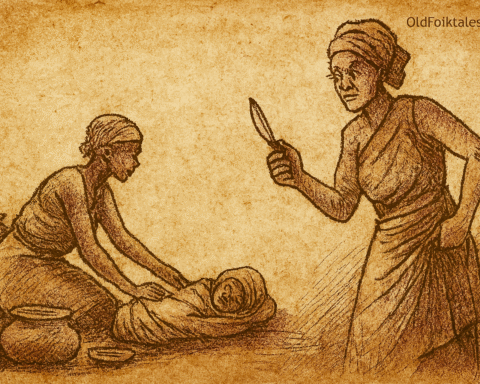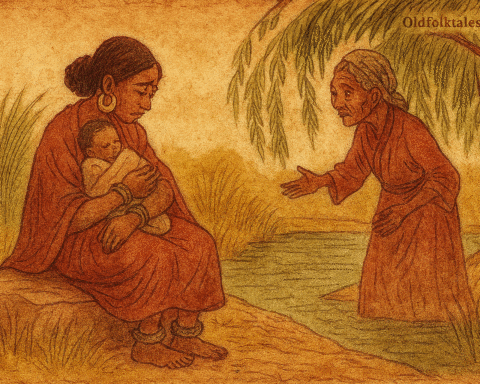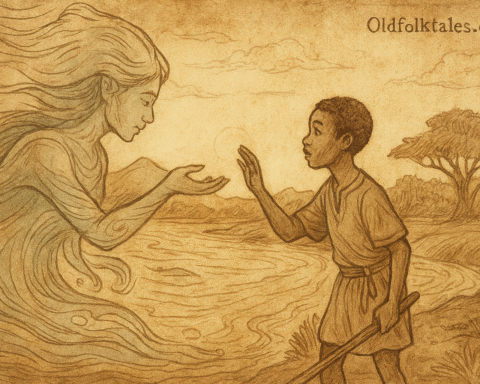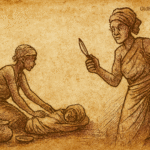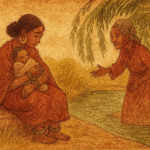In a time when the sun painted golden shadows across the vast African landscape, there lived a hardworking farmer who took great pride in his expansive bean garden. Row upon row of green bean plants stretched as far as the eye could see, their leaves dancing gently in the warm breeze. This garden was the farmer’s livelihood, his hope for the coming harvest season.
The farmer had a young son, innocent and trusting, who often helped tend to the precious crops. One morning, as the first rays of sunlight kissed the earth, the farmer prepared to leave for his daily work in the distant fields. He called his son to his side, placing a gentle but firm hand on the boy’s shoulder.
“My son,” he said with the weight of responsibility in his voice, “I must go to work now. Please watch over our bean garden carefully. Let no harm come to our crops, for they are our future.”
Also read: The Enchanting Hare and Fig Tree
The boy nodded solemnly, understanding the importance of his father’s trust. As his father disappeared over the horizon, the child settled himself in the shade, vigilant eyes scanning the green expanse before him.
But hidden behind the gnarled trunk of an ancient baobab tree, a cunning hare had been listening to every word. This was no ordinary hare it was known throughout the land for its silver tongue and mischievous nature. Its eyes gleamed with opportunity as it watched the farmer depart.
The moment the father was out of sight, the hare emerged from its hiding place, approaching the boy with calculated charm. Its voice was smooth as honey, its manner persuasive and confident.
“Young one,” the hare said with a theatrical bow, “your wise father came to me before he left. He told me to tell you something very important.” The boy’s eyes widened with innocent curiosity.
“Your father wants you to tie me up right where the bean plants are greenest and most tender,” the hare continued, gesturing toward the most lush section of the garden. “He said this would help protect the crops in a special way that only I understand.”
The trusting boy, believing every word, fetched a strong rope and carefully tied the hare exactly where it had requested. What followed was a feast of epic proportions. The hare devoured bean after bean, its belly growing rounder with each passing hour. It munched and crunched from sunrise to sunset, leaving a trail of destruction in its wake.
As dusk painted the sky in shades of orange and purple, the satisfied hare turned to the boy. “Now untie me, child. My work here is done for today.” The obedient boy loosened the rope, and the hare bounded away into the gathering darkness.
This deceptive routine continued day after day. Each morning brought the same convincing words, the same trusting response, and the same devastating result for the bean garden.
Finally, the father returned to inspect his precious crops. His heart sank as he surveyed the damage patches of his garden had been completely stripped bare. Confusion and anger clouded his features as he confronted his son.
“Son, explain this to me,” he demanded, his voice tight with controlled emotion. “Why have you only watched one side of the plantation? Look at this destruction!”
The boy’s eyes filled with confusion and hurt. “But father, I did exactly what you asked! You sent the hare to eat here, and I helped her just as you instructed.”
“I did what?” The father’s voice rose in disbelief. “I never sent any hare to destroy our crops!”
“But she told me you were the one who sent her!” the boy protested, tears beginning to form.
Understanding dawned on the farmer’s weathered face. His son had been deceived by a clever trickster. Taking a deep breath to calm his anger, he placed a protective arm around the boy.
“Listen carefully, my son,” he said firmly. “Tomorrow, when that lying hare returns, you must tie her up as tightly as possible. No matter what she says, no matter how she pleads, do not untie her until I return. Do you understand?”
The next morning arrived with the hare’s predictable appearance, chattering away with the same false charm. But this time, the boy was prepared. He tied the rope with extra knots, securing the trickster firmly.
“My father told me to tie you up properly,” the boy announced with newfound confidence. “He said I must not untie you, no matter what you say.”
The hare’s eyes darted frantically as it realized its predicament. Panic began to set in as the sun climbed higher, bringing the father’s return ever closer. Then, salvation seemed to appear in the form of a mighty hyena passing through the area.
“Auntie Hyena!” the hare called out desperately, its voice dripping with false urgency. “Please come here quickly! A dear friend of mine has just slaughtered a magnificent, fat sheep. He specifically asked me to consume it, but if I don’t eat it soon, he says he’ll kill me in anger!”
The hyena’s mouth watered at the mention of fresh meat. “Where is this feast?” she asked greedily.
“You see, I’m tied up here as part of a ritual,” the hare explained smoothly. “If you untie me, I can tie you in my place, and you can enjoy the entire sheep. What do you say?”
Blinded by the promise of an easy meal, the hyena quickly untied the hare. In a flash, the cunning creature bound the hyena tightly in its place and disappeared into the brush just as the farmer’s footsteps could be heard approaching.
The father arrived with a red-hot iron rod in his hands, his face set with grim determination. “So, you’re the one who has been deceiving my innocent son!” he declared, raising the glowing iron. “You told him I asked you to destroy my crops!”
The confused hyena tried to explain, but the farmer’s anger was beyond reasoning. He struck with the heated iron again and again until the poor hyena, victim of the hare’s deception, finally perished.
From his hiding place in the dense undergrowth, the hare watched the tragic scene unfold. When all was quiet, it crept out and whispered to itself with relief, “Phew! I just escaped death by the narrowest of margins.”
And with that, the clever hare disappeared into the wilderness, leaving behind a tale of cunning, deception, and the terrible price paid by the innocent.
Moral Lesson
This powerful folktale teaches us that deception and cunning, while they may provide temporary gains, ultimately lead to harmful consequences for both the deceiver and the innocent. The hare’s clever words protected it from immediate punishment but resulted in the death of an innocent hyena. The story reminds us that lies create webs of confusion that often trap the wrong victims, and that wisdom lies in honesty and straightforward communication rather than manipulation.
Knowledge Check
Q1: Who are the main characters in this African folktale? A: The main characters are a hardworking farmer, his innocent son, a cunning hare (the trickster), and a hyena who becomes an unwitting victim of deception.
Q2: What does the hare symbolize in African folklore traditions? A: In African folklore, the hare typically symbolizes cunning intelligence and trickery. It represents the clever underdog who uses wit rather than strength to survive, though sometimes this cleverness leads to harmful consequences.
Q3: What lesson does the father’s reaction teach about trust and verification? A: The father’s response demonstrates the importance of verifying information rather than blindly trusting. When he discovers the deception, he teaches his son to be more cautious while still maintaining trust within the family relationship.
Q4: How does this story reflect traditional African storytelling elements? A: This folktale contains classic African storytelling elements including animal tricksters, moral lessons about behavior, the importance of family bonds, and consequences for dishonesty. It also features the rural agricultural setting common in traditional African tales.
Q5: What role does the innocent hyena play in the story’s message? A: The hyena represents how innocent parties often suffer the consequences of others’ deceptions. Her tragic fate emphasizes that lies and trickery harm not just the intended targets but can destroy completely innocent victims.
Q6: Why is the bean garden setting significant to the story’s meaning? A: The bean garden represents livelihood, hard work, and family survival. Its destruction by the hare’s deception shows how trickery can damage not just relationships, but the very foundation of a family’s well-being and future security.
Source: The Multicolored diary

